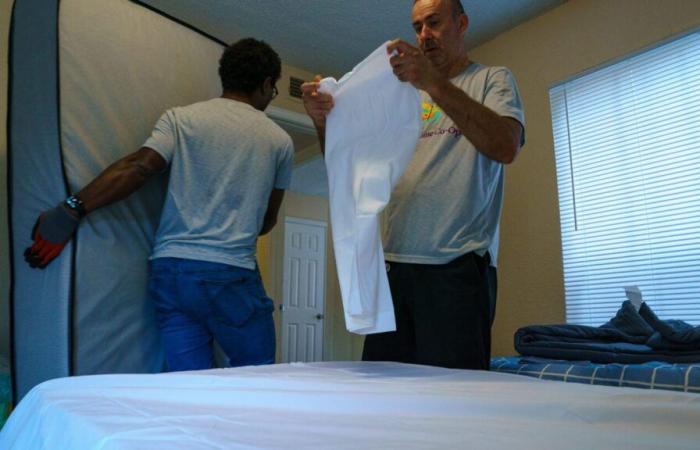
Resettlement organizations have had to be flexible as presidential administrations change.
Georgia is expected to welcome nearly 4,000 refugees this fiscal year. That’s highly prompted by Biden administration goals, and several times higher than in the years of the Trump administration.
Data from the Coalition of Refugee Service Agencies (CRSA) show Georgia settled 499 refugees in the last year of policies set by the Trump administration. The coalition includes agencies with federal contracts to resettle refugees, and nonprofits who help once the basic logistics are set.
The Republican nominee said he plans to reinstate restrictive admission policies, including banning people from Muslim countries.
CRSA co-chair Ashley Coleman said resettlement agencies are poised to adapt if needed after the election.
“The emphasis can really kind of shift in a couple of different directions,” she said. “One is more focus on depth.”
When a refugee is resettled to the U.S., they are placed in an apartment, given basic household items, and have a case worker who guides the person to getting work or being placed in school. That initial support is for 90 days.
Nonprofits often step in after the federal resource ends, like Ethaar, a nonprofit helping refugees and immigrants build their lives in Georgia.
“When someone is resettled, they get one plate per person, one spoon, one fork. So basic utensils, basic cutlery, and then pots and pans. That’s really it,” said Mona Megahed, the vice president of Ethaar.
Megahed said nonprofits are able to add touches of home and the help of the community to make resettlement less sterile. One way Ethaar does that is by offering additional items not mandated by the federal resettlement guidelines to help newly arrived families.
“Like in my kitchen, I have a microwave and I have a blender and a food processor, and I have a vacuum cleaner and a TV and toys and books,” she said, “and that’s kind of where we’re like, well, this is a gap that we can fill.”
Megahed says after Trump took office and refugee resettlement was diminished, Ethaar still had resources and volunteer energy to help even though there were fewer families. The nonprofit decided to take that energy and return it to families who had been resettled to the metro area for longer. Ethaar hosted workshops to understand what basic needs were still unmet.
In that process, they learned a big stressor for refugee women in metro Atlanta was not being able to drive.
“Many of the women felt that there was so much pressure on their family because they were depending on their husband to do everything,” Megahed said. “He goes to work. He comes back. We have to go grocery shopping. If a child calls in sick from school, he does not work, which is lost income to go pick up that child.”
They started a program called Women Behind the Wheel. It offers up to 14 hours of free driving lessons behind the wheel, which can sometimes cost the nonprofit around $600 per client.
Ethaar’s classes have been a success in teaching women how to drive. The organization has managed to continue it with extra fundraising efforts, as they do not receive government funding, and is working to keep up with increasing numbers of refugee families.
Megahed said their work won’t stop, but can expand or become more refined depending on who’s elected.





